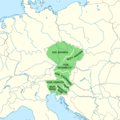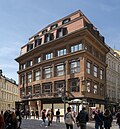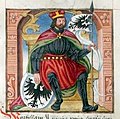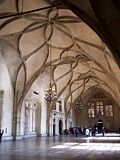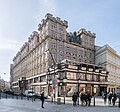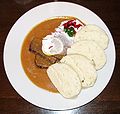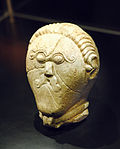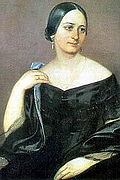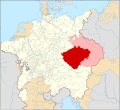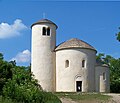Portal:Czech Republic
Welcome to the Czech Portal!
Vítejte na Českém portálu!

|

|

| |
The Czech Republic, also known as Czechia, and historically known as Bohemia, is a landlocked country in Central Europe. The country is bordered by Austria to the south, Germany to the west, Poland to the northeast, and Slovakia to the southeast. The Czech Republic has a hilly landscape that covers an area of 78,871 square kilometers (30,452 sq mi) with a mostly temperate continental and oceanic climate. The capital and largest city is Prague; other major cities and urban areas include Brno, Ostrava, Plzeň and Liberec.
The Duchy of Bohemia was founded in the late 9th century under Great Moravia. It was formally recognized as an Imperial Estate of the Holy Roman Empire in 1002 and became a kingdom in 1198. Following the Battle of Mohács in 1526, all of the Lands of the Bohemian Crown were gradually integrated into the Habsburg monarchy. Nearly a hundred years later, the Protestant Bohemian Revolt led to the Thirty Years' War. After the Battle of White Mountain, the Habsburgs consolidated their rule. With the dissolution of the Holy Roman Empire in 1806, the Crown lands became part of the Austrian Empire.
During the 19th century, the Czech lands underwent significant industrialization. Following the collapse of Austria-Hungary after World War I, most of the region became part of the First Czechoslovak Republic in 1918. Czechoslovakia was the only country in Central and Eastern Europe to remain a parliamentary democracy during the entirety of the interwar period. After the Munich Agreement in 1938, Nazi Germany systematically took control over the Czech lands. Czechoslovakia was restored in 1945 and three years later became an Eastern Bloc communist state following a coup d'état in 1948. Attempts to liberalize the government and economy were suppressed by a Soviet-led invasion of the country during the Prague Spring in 1968. In November 1989, the Velvet Revolution ended communist rule in the country and restored democracy. On 31 December 1992, Czechoslovakia was peacefully dissolved, with its constituent states becoming the independent states of the Czech Republic and Slovakia.
The Czech Republic is a unitary parliamentary republic and developed country with an advanced, high-income social market economy. It is a welfare state with a European social model, universal health care and free-tuition university education. It ranks 32nd in the Human Development Index. The Czech Republic is a member of the United Nations, NATO, the European Union, the OECD, the OSCE, the Council of Europe and the Visegrád Group. (Full article...)
Selected article -
On the night of 5 April 1944, Siegfried Lederer, a Czech Jew, escaped from the Auschwitz concentration camp wearing an SS-TV uniform provided by SS-Rottenführer Viktor Pestek. Pestek opposed the Holocaust; he was a devout Catholic and was infatuated with Renée Neumann, a Jewish prisoner. Pestek accompanied Lederer out of the camp, and the two men traveled together to the Protectorate of Bohemia and Moravia to obtain false documents for Neumann and her mother.
Lederer, a former Czechoslovak Army officer and member of the Czech resistance, tried unsuccessfully to warn the Jews at Theresienstadt Ghetto about the mass murders at Auschwitz. He and Pestek returned to Auschwitz in an attempt to rescue Neumann and her mother. Pestek was arrested under disputed circumstances and later executed. Lederer returned to occupied Czechoslovakia, where he rejoined the resistance movement and attempted to smuggle a report on Auschwitz to the International Committee of the Red Cross in Switzerland. After the war he remained in Czechoslovakia. The story of the escape was retold by Lederer and writers including historian Erich Kulka. (Full article...)
Selected picture

Source: Národní Galerie v Praze, PD
In this month
- 5 April 1937 – Prague Václav Havel Airport (pictured) opens as Prague Ruzyně Airport
- 7 April 1348 – Charles University in Prague is founded
- 17 April 1969 – First Secretary of the Communist Party of Czechoslovakia, Alexander Dubček, is replaced by Gustáv Husák
- 18 April 1920 – The first parliamentary elections are held in Czechoslovakia
- 26 April 1945 – The Red Army liberates the city of Brno at the end of World War II
Categories
Selected biography -
Vojtěch Jarník (Czech pronunciation: [ˈvojcɛx ˈjarɲiːk]; 22 December 1897 – 22 September 1970) was a Czech mathematician. He worked for many years as a professor and administrator at Charles University, and helped found the Czechoslovak Academy of Sciences. He is the namesake of Jarník's algorithm for minimum spanning trees.
Jarník worked in number theory, mathematical analysis, and graph algorithms. He has been called "probably the first Czechoslovak mathematician whose scientific works received wide and lasting international response". As well as developing Jarník's algorithm, he found tight bounds on the number of lattice points on convex curves, studied the relationship between the Hausdorff dimension of sets of real numbers and how well they can be approximated by rational numbers, and investigated the properties of nowhere-differentiable functions. (Full article...)
Did you know?

- ...that, although Mozart never visited Kroměříž, much of the Academy Award-winning film Amadeus was filmed at the local episcopal residence?
- ... that in 2013, the Czech Republic plans to directly elect its president for the first time in its history?
- ... that Czech international footballer Jan Suchopárek dislocated his shoulder while attempting a bicycle kick?
- ... that Czech actress Anna Letenská was killed by the Nazis for her alleged participation in the assassination of Reinhard Heydrich?
General images
Related portals
Topics

Czech lands: Bohemia • Moravia • Czech Silesia
History: Únětice culture • Boii • Marcomanni • Samo • Great Moravia • Přemyslid dynasty • Lands of the Bohemian Crown • Czech lands (1526–1648) • 1648–1867 • 1867–1918) • Czechoslovakia • Czech Republic
Geography: Lakes • Protected areas • Regions • Rivers
Law: Judiciary • Law enforcement • Supreme Court of the Czech Republic
Politics: Administrative divisions • Government • Constitution • Elections • Foreign relations • Army • Parliament • Political parties • President • Prime Minister
Economy: Banks • Czech koruna • Energy • Oil and gas deposits • Stock Exchange • Tourism • Transport
Culture: Architecture • Art • Cinema • Cuisine • Demographics • Education • Language • Literature • Media • Music • Philosophy • Prostitution • Public holidays • Religion • Sport • Television • Video games
Symbols: Flag • Coat of arms • National anthem (Kde domov můj)
Lists: Outline of the Czech Republic • List of Czech Republic–related topics
WikiProjects
Featured and good content
Things to do
Wikimedia
The following Wikimedia Foundation sister projects provide more on this subject:
-
Commons
Free media repository -
Wikibooks
Free textbooks and manuals -
Wikidata
Free knowledge base -
Wikinews
Free-content news -
Wikiquote
Collection of quotations -
Wikisource
Free-content library -
Wikiversity
Free learning tools -
Wikivoyage
Free travel guide -
Wiktionary
Dictionary and thesaurus





